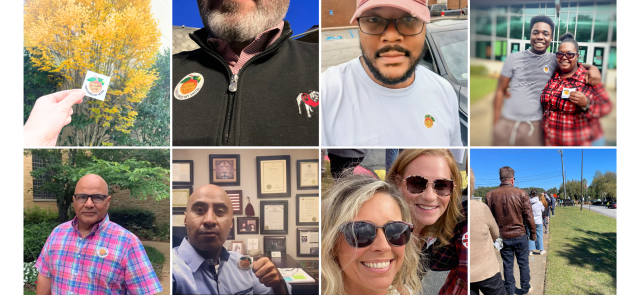Stay ahead of the curve as a political insider with deep policy analysis, daily briefings and policy-shaping tools.
Request a DemoMeet Georgia’s Preschool and Daycare Chief

Credit: iStock
- Playmaker: Amy Jacobs
- Role: Commissioner of the Georgia Department of Early Care and Learning
- Tenure: 2014 to present
The road out of the COVID-19 pandemic looks tough for Amy Jacobs, who oversees preschool and daycare services for hundreds of thousands of toddlers and their families in Georgia.
Jacobs, who heads Georgia’s Department of Early Care and Learning (DECAL), faces a recent loss of preschool teachers during the pandemic to higher-paying jobs and the looming end of life-saving federal relief for local child-care programs. She’s also watching President Joe Biden’s administration’s proposal for nationally funded universal preschool to see what costs it could bring to Georgia’s existing state-run preschool program.
Amid challenges, the 22-year veteran of state government sees opportunities for building preschool-teacher training programs to help boost early-education staff across Georgia, particularly since the pandemic has exposed the need for healthy preschools and daycares that prepare children to succeed in school and allow parents to work jobs without having to devote all their time to child care.
State Affairs sat down with Jacobs for a conversation about her life, career and view of the agency she runs as Georgia’s child-care services rebounds from the pandemic. Her responses have been edited for length and clarity.

Amy Jacobs has led Georgia’s Department of Early Care and Learning since 2014. (Credit: Georgia Department of Early Care and Learning)
What is the professional path that led to your current role?
Jacobs helped draft annual budgets for education-focused state agencies including DECAL while working at the Governor’s Office of Planning and Budget. She aimed to pursue a career in government after graduating from the University of Georgia. Her career at DECAL has spanned the administrations of Govs. Sonny Perdue, Nathan Deal and Brian Kemp.
“My time at [the budget office] really gave me perspective that you can’t get anywhere else in state government, dealing with all different policy areas and all different state agencies and really getting a look at how that process works.”
“We worked on budgets and policy for everything from our Department of Early Care and Learning all the way through the University System. I had that insight into the budget process and the legislative process and the policies and laws that impact all those agencies.”
- Read about how Georgia has more than $1 billion in lottery reserves sitting untouched as local preschools lose teachers to better-paying jobs at Target and Walmart in our story, “Georgia has Lost Thousands of Preschool, Daycare Teachers. Can the Lottery Help?”

Children learn social skills at the Frazer Center in Atlanta. (Credit: Paige McKay Kubik)
Was there a defining moment in your life or career that helped guide you to this role?
Jacobs grew up in Rockdale County with parents who both owned and operated child-care centers. Watching her parents, Jacobs said, showed her the challenges of running a tight-budget business in the child-care industry and the benefits that children receive from high-quality preschools and daycares.
“I was able to see the tremendous responsibility they had as they cared for these really young children day in and day out, making sure they were safe while also supporting their workforce, their teachers.”
“I think that really brings a perspective especially to my role that I don’t know we’ve ever had in the commissioner role at DECAL. Lots of commissioners have had lots of different experiences, but I believe that me having this personal child-care owner-operator experience has really helped bring a good perspective.”
- Read about how Georgia pays for four-year-old preschools through lottery ticket sales – while younger-serving daycares miss out on those dollars – in our Explainer story, “Georgia Daycares Miss Out on Millions in Lottery Dollars.”
 Children learn about plants and insects at the Frazer Center in Atlanta. (Credit: Paige McKay Kubik)
Children learn about plants and insects at the Frazer Center in Atlanta. (Credit: Paige McKay Kubik)
What are your major accomplishments at DECAL so far?
Jacobs’ tenure as commissioner since 2014 saw DECAL increase the number of local preschools and daycares designated as “Quality Rated” programs from 300 to now more than 2,700. The three-star rating system assesses programs based on certain child learning and teacher benchmarks and can result in financial benefits such as state-funded staff bonuses.
“The research is very clear that if you can expose children to a high-quality learning environment, they’re much more likely to enter kindergarten prepared and meet all those other milestones like reading on grade level and graduating from high school.”
“Not only overall are we seeing numbers increase, but we’re seeing those numbers increase among children from [low-income] families that will benefit the most from that Quality Rated early learning. I think that is a huge accomplishment.”
 Georgia’s child-care workforce dropped by 20% between 2017 and 2020. (Credit: Brittney Phan for State Affairs)
Georgia’s child-care workforce dropped by 20% between 2017 and 2020. (Credit: Brittney Phan for State Affairs)
What challenges and criticism have you faced during your time in leadership?
Amid a boost in higher-quality programs, Jacobs’ tenure has also seen a recent drop in the number of child-care staff at preschools and daycares. To bridge the gap, Jacobs said she’s focused on bolstering training child-care teachers through college partnerships and DECAL staff-support specialists.
“What we’re seeing now are workforce issues, more than we’ve ever seen in Georgia preschools. We’re having to hire more substitutes because they can’t get certified teachers.”
“We think we need to look at, how do we enhance the pipeline, starting with the assistant teachers? … We’ve got to do some other things that are not monetary that are more systematic behind-the-scenes to really build that career path for these individuals to even enter the field and then stay in the field.”
 Georgia has more than $1 billion in lottery reserves that could be used to fund preschool programs and teacher salaries. (Credit: Brittney Phan for State Affairs)
Georgia has more than $1 billion in lottery reserves that could be used to fund preschool programs and teacher salaries. (Credit: Brittney Phan for State Affairs)
What are your plans for what you want to accomplish going forward?
Local preschools and daycares have leaned on hundreds of millions of dollars in temporary federal COVID-19 relief to avoid closing amid staff shortages and lower child enrollment. With that money largely set to end in two years, Jacobs has concerns about how to keep programs running without additional long-term funds. She’s also monitoring the Biden administration’s pitch to fully fund preschools for four-year-old and three-year-old children in the U.S.
“Frankly, I am very worried about the one-time nature of the funds. That’s what we’re trying to really figure out right now: what can we put behind this that is sustainable for DECAL to do for child care so that there’s not a huge detrimental impact when the money runs out?”
“We don’t know that child care has that capacity throughout the state [for expanded universal preschools]. It would take years to build up the actual physical capacity of just buildings and then getting the workforce on top of that before any of that would come to fruition.”
Who in Georgia’s state government do you want us to profile next? Share your thoughts/tips by emailing [email protected].
Georgia defies bomb threats as election chief declares a “free, fair and fast” vote amid record turnout
ATLANTA – Despite dealing with over 60 bomb threats, Georgia’s election chief said Tuesday the state’s general election went smoothly. Georgia had a record turnout with nearly 5.3 million people voting, Secretary of State Brad Raffensperger told reporters. Election officials in the state’s 159 counties have until 5 p.m. to certify votes. “We had a …
In the (state)house: Meet the newest members of the Georgia legislature
When lawmakers reconvene at the state Capitol on Jan. 13, there’ll be a cadre of new faces in the 236-member Georgia General Assembly, one of the nation’s largest state legislatures. All 236 statehouse seats were up for election this year. Most candidates ran unopposed. Incumbents in contested races easily kept their seats, with the exception …
2 young Democrats win Statehouse seats as Republicans hold majority
ATLANTA — Many Statehouse incumbents appeared to beat back challengers Tuesday, ensuring their return to the Capitol in January. Republicans retain control of the House and Senate. Two Generation Z candidates will join the 236-member Legislature as new members of the House of Representatives: Democrats Bryce Berry and Gabriel Sanchez. Berry, a 22-year-old Atlanta middle …
Election night 2024: What to watch for as the results roll in
It’s been a long time coming, but we’ve finally made it to Election Day 2024. Today’s most anticipated race is, of course, the presidential contest between Vice President Kamala Harris and former President Donald Trump. The pair have spent a combined $25 million in new media ads alone in the past two weeks in this …




